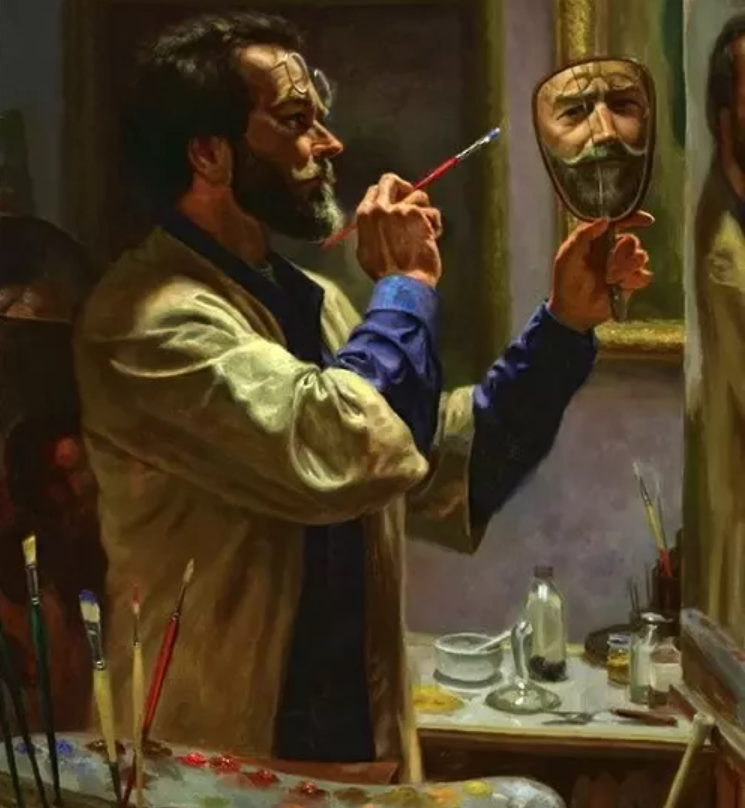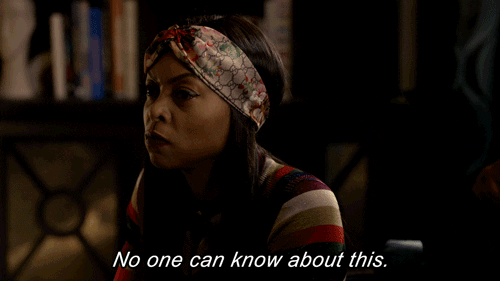
All of us have a need to belong and be accepted by others. One way we try to do this is by masking. We adopt appropriate behaviors and personas, unconsciously or consciously, to fit in. While wearing social masks that align with our roles is important, we must watch out for being overly dependent on them. If your fear of people not liking you is causing you to wear false masks that hide your true self, it’s time to take a closer look. In this way, we can express our truth. (Estimated reading time: 9 minutes)
“We understand how dangerous a mask can be. We all become what we pretend to be.”
— Patrick Rothfuss
“All the world’s a stage,
And all the men and women merely players.”
If you’re an English literature enthusiast (or you recall what you read in school), you’ll recognize this line from William Shakespeare’s “As You Like It.”
In the play, Jacques compares life to the theater. Each of us lives a script preordained by a higher order, either God or social influences.
Shakespeare suggests that we’re caught up in our own dramas in which we act and present ourselves differently depending on who we’re with (our audience.) For instance, while playing poker with your buddies, you might take on the role of a friend. In the workplace, while you might still be friendly with your colleagues, you’d probably be formal and deliberate in your approach.
Aligning our behavior with the roles we play requires us to change faces. This phenomenon is called “masking” – a process in which people change or “mask” their natural personalities to conform to conventional behaviors and meet social standards. This theatrical metaphor not only makes us aware of this coping mechanism, but also raises questions about our use of masks.
Wearing social masks is important as how we present ourselves is context-dependent. But we must watch out for being overly dependent on them.
Do the social masks we wear resemble who we really are deep down? Our responses to this inquiry will determine the extent to which we hide our true selves and express our truth, especially to those to whom we’re close.
Why we wear social masks: the need to belong

We all have a deep, intrinsic need to fit in and belong. We are social creatures who depend on each other for survival. We express our need for acceptance by conforming to social and cultural norms.
We unconsciously or consciously adopt appropriate behaviors and personas to ensure security and stability. In some instances, it’s essential – like following laws so that we don’t get into trouble and possibly face jail time. Other times, it’s simply due to a fear of being cast out.
Masking is a learned behavior that begins as early as childhood when caretakers discipline us. We use it to fall in line with what’s socially acceptable. These rules can range from our personal hygiene to our manners. Social indoctrination exists in all cultures and at all levels of society.
The masks we wear depend on various contextual factors, including location, status, and relationships. From a broader perspective, our masks are shaped by our culture, gender, self-esteem, and mental health.
For example, women are often subjected to the rule that girls must act nice and are implicitly expected to tone down any form of aggression and anger. Certain cultures frown upon overt expression of emotions, while others prefer more passion and fervor in communication.
However, when we’re stressed and tired of being someone we aren’t, our masks drop, and we show the world who we really are. For example, at the end of a long and exhausting workday, we’re more likely to show our disdain towards a rude person than we would be earlier in the day.
The false self lurks: when social masks go wrong

Social masks play an important role in maintaining order and decorum in our world – but it becomes a problem when the face we present is not genuine. Putting on a false persona for long durations is exhausting and causes us to feel out of integrity.
For example, if we’re insecure about our societal position, we might name-drop and overstate our achievements. If we’re fearful and unsure, we might become aggressive and defensive. We may post flashy images on Instagram even if we’re in debt or recovering from heartbreak.
Wearing social masks is meant to help us build rapport with others, but we misuse masks if we hide behind them because we’re afraid to reveal ourselves. We believe that we’re protecting ourselves when we’re actually closing ourselves off from authentic connections.
Each person wears their mask differently. Depending on how they were raised, people learn behaviors that they think will win the approval of others.
Often, people are unaware of their masks and tend to project them onto others. Some know their masks and use them to get what they want.
Whether or not we’re aware of our masks, we must know how we use them. By doing so, we stay in touch with our true selves and gain more control over how others perceive us. We’ll be better able to manage our past hurts and triggers.
Unmasking: how to reveal our true selves and express our truth

Wearing masks that reflect our authentic selves is anything but easy. Outside forces bombard us in restrictive social environments that alter our qualities and personal expression. Poet E. E. Cummings addressed this universal challenge when he said:
“To be nobody but yourself in a world that is doing its best, day and night, to make you everybody else means to fight the hardest battle which any human being can fight; and never stop fighting.”
If you’ve ever experienced imposter syndrome, the fear that the world will find you out, you can be sure that you’ve been in disguise for a while. The feeling of being a fake and that you don’t really belong in a certain place or position is an internal cry for help. Imposter syndrome signifies that you’ve become overly attached to a false mask.
One of the biggest gifts we can give the world is showing up exactly as we are. When we do that, we bring along everything that is unique to us – our personalities, talent, and heart. As Oscar Wilde said, “Be yourself; everyone else is taken.”
According to author and coach Martha Beck, being in integrity with what we believe to be true is the cure for happiness. In an interview, she said:
“When you go deep inside yourself and you find what is true for you, that is the source of your peace, your joy, your happiness, your direction in life. When you move away from what you deeply know to be true and you split from your integrity…. All that’s necessary to heal is to find your own truth and begin to live in harmony with it. And all the psychological suffering goes away.”
If your fear of people not liking you is causing you to wear false masks that hide your true self, it’s time to take a closer look. Here’s how:
1. Identify the type of masks you’re wearing
By knowing the protective shields you use, you can begin to heal and understand how you can take the good parts from the persona.
A fun way to identify the masks you typically wear is to link them to archetypes, defined as “a primitive mental image inherited from the earliest human ancestors, and present in the collective unconscious.”
By understanding your archetypes and actively working with them, you can attain greater self-awareness to activate personal and spiritual growth. It will help you know yourself at a deeper, nuanced, and intuitive level.
Some common archetypal masks we wear include the hero, the cool guy, the damsel in distress, the joker, the martyr, the social butterfly, the overachiever, the beauty queen, the hermit, and the bully.
2. Ask what you’re trying to hide and why
We tend to hide the parts of ourselves that we perceive as unworthy and unlikeable. The most common things we conceal are:
- Failures and mistakes
- Issues from our past
- Challenges that we’re ashamed about
- A forbidden love
- Secret habits and fears
Look at this list and identify which ones resonate with you. It could be as simple as getting fined for littering to more significant issues such as childhood abuse.
Most of us hide things because we’re convinced that our friends and family won’t like what they see. We believe the best way to preserve the relationship is to leave those unsavory parts out of ourselves. However, this comes at a high cost – sooner or later, you’ll feel like a fraud.
It may help to explore your feelings about your shame further with the help of a friend or therapist.
3. Figure out what you’re comfortable revealing

Removing false social masks does not mean that you have to share everything with everyone. Keeping intimate and personal details about your life to yourself is appropriate and necessary – not every person you meet can hold space for you and respect what you share.
Take some time to figure out where you draw boundaries with the people in your life. With some of them, you may be comfortable sharing only surface-level details about your life, such as what you ate for breakfast or the crazy traffic you encountered on your way to work.
You can share much more in relationships with close, trusted family members, friends, and your partner. Knowing they will support and validate your feelings, you may be okay with divulging emotional matters like hope, dreams, fears, and frustrations.
But remember to be mindful about how much you unload during your conversations. If you’re facing deeper, more painful, complex issues, consider speaking to a therapist or coach.
4. Slowly open up to the right people
Once you decide what part of your life you’re willing to reveal, the next step is to narrow down the list of people around whom you can unmask or offer more transparency. Most people have at least one or two people on that list, like a BFF or their life partner.
We tend to hide more around certain people in our work and personal lives. This includes anyone who makes us feel unsafe, criticizes and judges us, or is inconsistent. Weed out these people and either build healthy boundaries or end the relationship with them.
There will be some people who you’re unsure about. You don’t know how they would react to your true self. They could accept or reject you, but you would like to give them a chance. If you’re in this position, ask yourself if you can trust this person and how you feel around them. If your answers are mostly positive, it’s worth giving it a try.
5. Use the power of vulnerability to build trust
No one likes to be around a little miss (or mister) perfect. Plenty of research shows that we tend to like those who are fallible. So, if we’re wearing a social mask of perfection, we’re not going to get the results we want in our interactions.
To build trust in others, we must allow ourselves to be vulnerable. When we’re willing to admit our mistakes, try something new or ask for help and feedback from others, we show our humanity. This can put people at ease, and they are more likely to open up to us.
When used appropriately, vulnerability is not a flaw but a doorway that opens opportunities for meaningful and authentic connections based on trust.
Each one of us is as unique as a snowflake. When we hide behind social masks, we deprive the world of all the gifts, talents, and insights we bring to the table. By getting comfortable in our skin, we can express our truth and allow ourselves to contribute in meaningful and lasting ways.
All my best on your journey,
Seline

Question for you: What social masks do you tend to wear? Are they a reflection of your true self?
Did you like this post? Sign up below, and I’ll send you more awesome posts like this every week.

Nice Article Seline. Everyone seems to wear a mask these days…it’s time to get real!
I think something that is important to remember is that yes we should all be able to be real and our true selves, but some people can’t. There is so much pressure to live up to others’ standards and criteria and there is such pushback against those who are not ‘normal’ that many people fear being their true selves. And that is a sad sad reality today it seems 🙁
SO true so true! All of this rings true for me. There is a lot that gets changes, hidden, and lost becuase of social media and the impact we let it have on our lives! It is a powerful thing…. much more powerful than many people realize.
It is especially hard for anyone that fits into anything that is concidered a minority or fringe group- POC, women, LGBTQ, different religions and racial groups…. there are so mnay things society puts pressure on that causes people to hide certain things about themselves. It really is sad.
I was coming here to say this exact same thing! It’s so hard when society tries to force to be something you are not or tries to force you not to show who you really are. It makes a complicated and difficult thing all the more challenging and painful at times. And I say this as a Transwoman living in one of the most conservative states in the US. Social pressure to conform sucks!